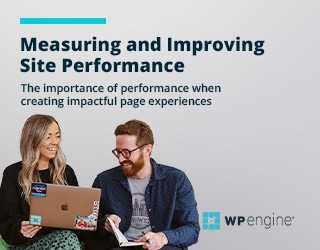

Core Web Vitals: The Importance of Site Performance
With the introduction of Google’s page experience update, Core Web Vitals have become an increasingly important topic for site owners and developers around the world.
That’s because these user-centric metrics, which gauge distinct aspects of the end-user experience, now play a (growing) role in the way Google ranks websites.
This ebook, which was co-authored with Google and 10up, a WP Engine Agency Partner, provides a closer look at website performance and why it matters more than ever, with specific steps you can take to measure and improve site performance using Core Web Vitals.
Download the full report, or read the excerpt below for a preview!
Why Performance Matters, More Than Ever
Performance isn’t just about speed. More than ever before, building a website that performs well requires a deeper focus on the overall end-user or page experience. While speed certainly plays a role, performance should encompass a number of factors aimed at creating fast, responsive, and stable websites that deliver a great page experience to each user.
Not only are these best practices for building better websites and creating a more delightful web, building sites with a focus on performance as it relates to page experience affects that crucially important moment in which a user decides to further engage with you, either by consuming additional content or making a purchase. This decision is often made almost subconsciously, it’s usually based on a first impression, and it’s intrinsic to the success of your business.
Performance must be at the center of digital publishing platforms in order to create new and innovative experiences that engage and delight users while increasing business-driven metrics.
The Importance of Page Experience
There are three main reasons page experience is critical for publishers and their digital platforms. Below, we have outlined these areas, exploring why engagement, content sharing, and findability are all metrics that are directly impacted by page experience.
Page experience influences the depth of engagement. Sites that are slow to load and respond negatively impact a user’s experience both as an initial impression and on an ongoing basis. This impact manifests itself in a poor navigation experience, lowering the likelihood that a user will interact with your site in other ways that generate revenue.
Users must be able to quickly engage with your website in a meaningful way, enabling them to find what they’re looking for in an intuitive manner.
Page experience impacts the likelihood of your content being shared. Visitors are much more likely to turn into your advocates and share your links across social media and messenger apps if they not only like your products and services but also have a great time interacting with the experience your site provides.
Page experience is significant when considering findability, with a direct impact on results within Google Search. Search engines and aggregators seek to provide recommendations and answers that include the best possible experience for their users. If your site has a great page experience, it’s far more likely to stand out from the crowd.
Performance has a clear and measurable impact.
An improvement of speed by just 0.1 seconds can create meaningful, positive outcomes. In the case of Pfizer, a 38% improvement in speed resulted in a 20% decrease in bounce rate. eBay measured that just a 0.1-second speed improvement led to a .5% increase in additions to user shopping carts.
Measuring Page Experience
Optimizing for quality of page experience is key to the long-term success of any site. Getting it right requires appropriate focus on the right areas as well as ongoing attention and investment.
Annie Sullivan, who leads performance testing at Chrome, discussed the wide range of tools and metrics you may consider implementing within your organization. What she concludes is that there are very few that work well for top-level insights.
Ultimately, this means your organization will need to focus on a core set of metrics rather than a single point of measurement. To do this effectively, you will need to ensure that your chosen metrics are helping you make informed decisions, which are aligned to your core business goals and objectives; in short, they need to be: representative, accurate, consumable, stable, and real-time reflective.
Core Web Vitals have been introduced with this in mind, and represent a larger effort to provide unified guidance for quality signals that are essential to delivering a great page experience.
Core Web Vitals: Managed Hosting for WordPress Makes The Difference
Sites hosted with a managed provider built for WordPress, like WP Engine, are well-positioned for strong Core Web Vitals.
WP Engine is the only managed host for WordPress that provides solutions for all Core Web Vitals, as well as the fastest, most reliable managed platform.
From WordPress-specific server configurations and leading cloud solutions including Google Cloud Platform to WP Engine’s suite of StudioPress themes and headless front-ends powered by Headless WordPress, WP Engine offers solutions for both small and large sites, all built with Core Web Vitals and other user-centric metrics top of mind.
Read the full report to find out more!
